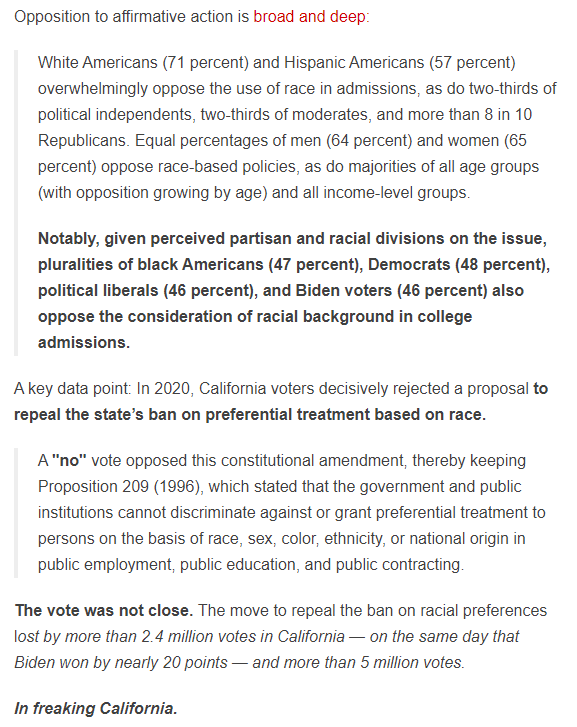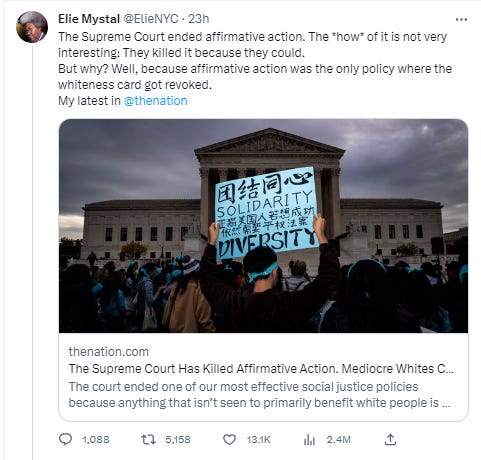On Thursday, the Supreme Court found that Affirmative Action violated the Equal Protection clauses of the 14th Amendment and struck it down. This was wholly anticipated. Basically, nothing had changed since the Court’s most recent decisions on the case in Grutter and Bollinger twenty years ago. The only difference was that the Court had shifted dramatically to the right in that time, and the outcome was what could be as expected.
I’m going to place my own thoughts on Affirmative Action in the “Recommended Stories” section and I hope you give it a look. But for the main part in this story, I want to focus on the reactions, of which there were many with some better than others.
Reading the Court opinion, here are the broad strokes:
Roberts wrote the decision. He’s known for his excessively narrow decisions and a certain love of obtuseness when it comes to this kind of policy. In the Shelby County decision, he gutted the Voting Rights Act claiming we’ve passed the point where remedial actions are no longer necessary for voting rights. What happened after that? States began restricting the rights of minorities to vote. Guess he was wrong there. So when it comes to this case, his words were careful, deliberate, and he used legitimate legal precedent and philosophy to eliminate Affirmative Action. He even used Sandra Day O’Connor’s line from Grutter that at some point (she threw out 25 years or so) there may be no more need for remedial action and diversity would just occur based on merit.1
It should also be noted that Roberts shot down Affirmative Action because it was demonstrated by the evidence that Asian Americans were detrimentally impacted, undermining the rationale for the program. All of the other rationales used to support the program were found to be immeasurable and likely to continue ad infinitum without any clear measurable goals.
The supplemental concurrences were relatively unnoteworthy, largely reiterations of the majority opinion. People point out the hypocrisy of Clarence Thomas’ position on it, as he himself was a beneficiary of the program. However, anyone who knows anything about Thomas knows he has always hated the program and found it more detrimental than helpful, as if an Affirmative Action recipient had a scarlet letter adorned to them.
The dissents were extremely passionate but had the feel of a 100+ page lecture on American history, far more expansive than the issue before them.
It would also be negligent to ignore that when it comes to Affirmative Action, nearly 2/3 of Americans disapprove, including pluralities of African-Americans and Democrats generally.
From Charlie Sykes this morning, citing the Liberal Patriot:
So the Court struck down a largely unpopular law. And as what happens whenever a divisive issue is decided by the Court, activists on both sides overdramatized the impact.
First off, I was appalled by some of the GOP response, which not only was akin to spiking the football, it was galling in its racism. Here is but a sample:
These were but a small snippet. The most offensive material was taken down, and believe me, there was a lot of it.
Liberals, as is their playbook, screamed like Chicken Little how the sky was falling, or turned their attention to legacy admissions. Nevermind that legacy admissions usually are accepted because as alumni they tend to donate back to the school. In addition, when it comes to Harvard, the student body is actually MORE diverse than society at large. Here’s AOC:
Elie Mystal was another typical voice in that corner.
Reading the article, it was dumbfounding. It was arrogant, belittling and alienating. Seriously, does Elie Mystal think this kind of rhetoric is going to help win support?
The more progressive audience applauded rhetoric like this. I just shook my head.
Incoming Harvard President, Claudine Gay, had an interesting and noteworthy statement regarding the university’s loss at the Supreme Court.
Finally, to me, the best response was by Michelle Obama, who authored a personal and hopeful message. I wish more had taken the time to consider the issue this way.
Michelle Obama’s statement was a beacon of light in a morass of negativity. It was a reminder that even when things occur outside of our control that don’t always go our way, we can still be better.
PurpleAmerica’s Recommended Stories
Last evening I had some drinks with a very good friend of mine, we’ll call him “Joe.” Joe is former military, originally from New Jersey (Jets fan) and the kind of jovial person people naturally gravitate towards. I’ve tried goading him into running for local office repeatedly because he’s always working for the good of the community. Joe is also an African American, and is a DEI coordinator by profession. Politically, he’s pretty liberal, but he always makes good points and to this day I’ve never heard him say an outrageous thing about any issue. He’s very easy to chat with.
I asked him what he thought of the matter, and what bothered him was the loss of opportunity for a lot of good people who grow up in bad spots and just need a way to get out. I mentioned what O’Connor had said previously, that at some point we won’t need Affirmative Action and his response was “we aren’t there yet.”
So when I got home last night, I thought a long time on the subject. It was hard to sleep. I grew up in a very white town, and could count the number of African Americans in my high school on one hand. For many in this country growing up like that, if you rarely saw blacks and only knew they were advantaged though Affirmative Action, you’d oppose it too. In college, I saw and interacted with more African Americans, but cultural divides and the self segregation that can happen prevented me from personally knowing very many.
When I got to law school, you tend to become close to everyone in your “group.” You’re going through the same things, you experience the same events, you cover the same thousands of pages of cases and you tend to end up at the same bars close to campus. “We’re all in this together” becomes somewhat a mantra. While there, I became friends with several colleagues who would admit Affirmative Action played a role in their being there. On the first days of school, some of them stumbled more than others; some of their white classmates snickered. What I would later learn is that early on it was more of a culture shock for them to come from an urban upbringing and a diverse city college to go to a very white area of the midwest and took time getting used to, but they eventually acclimated fine. Over the course of law school I saw them work harder than most everyone else. By graduation, several of them graduated with honors.
After graduating, you study for the Bar Exam, and most take Barbri courses to help them through the process. I couldn’t afford it and had to study on my own. I had previously given my annotated Federal Rules of Evidence book to an African American girl in my class who had her car broken into and all her books stolen the day before the finals. When studying in the Commons area, she came over all smiles returning the book and asked why I wasn’t taking the Barbri course. When I told her she nodded and sympathized. The next day her and her boyfriend (who graduated the year before) came by where I was studying and gave me his Barbri books and study guides from the year before. “We’re all in this together.”
She’s now a very successful attorney for a large biglaw firm.
Another affirmative action beneficiary I graduated with is a public defender in Chicago.
One affirmative action beneficiary I knew in undergrad is an attorney for a major Wall Street biglaw firm.
Lastly, probably the smartest attorney I have ever met as an attorney works for the General Counsel at one of the largest businesses in the world, and was the beneficiary of affirmative action.
All of those positions were EARNED. Period.
So my thoughts on Affirmative Action? Not only is it good for providing opportunity to people who otherwise wouldn’t have it, its a sound investment, taking people from different backgrounds and providing them the chance to succeed and give back to the world. If I were starting a company, I would hire many a beneficiary of an Affirmative Action program over an Ivy League graduate any day; I don’t know how that applicant may have gotten into Harvard or Yale but I’m pretty positive that AA graduate has had to work through a hell of a lot more obstacles and work harder than most. That kind of commitment is much more deserving of my respect.
As a program, it may not have been perfect. But it expanded diversity, got measurable results (regardless of what Roberts said in his opinion) and made the world a better place. And most importantly to me, it introduced me to lifelong friends, indirectly helped me pass the Bar Exam and expanded my knowledge of how to look at the world.
PurpleAmerica’s Cultural Corner
I don’t go out of my way to listen to a lot of podcasts, but one I always catch is Malcolm Gladwell’s Revisionist History. When it comes to college admissions, Gladwell has some serious problems with how they are conducted. He has made several episodes criticizing the US News and World Report rankings, and in Season 6 he worked to effectively improve the ranking of an HBCU. He regularly disdains the elitism at play and regularly brings up that most Ivy League endowments are so large they could have all the students go there for free, with housing, books and everything, and still make money because the endowment interest exceeds the operating budget. Check out some of his episodes.
The one I want to point out though specifically is a recent post about Hope College, a small college in western Michigan. I loved it because it gets to the point of what college is supposed to be all about.
https://www.pushkin.fm/podcasts/revisionist-history/a-good-circle
PurpleAmerica’s Final Word on the Subject
Like what you are seeing here at PurpleAmerica? Share and Comment. Let your friends and family know! Forward us topics you’d like us to discuss! It’s am open community here.
Footnotes and Fun Stuff
We’ll see on that one.















A very nuanced position.
In my high school year, we had 1 (singular) African American girl. She was bused in (70's and early 80's Silicon Valley) who I barely knew in school. I did spend an hour or so talking to her at our 30th reunion, and she is/was a lovely person, it made me wish I had known her when we were in school together, and that there were more people with her background. But alas, I do remember the fights between my parents when busing became a thing in the SF Bay Area, about how it was the worst thing ever.
I suspect we are far from there being anywhere near equality of opportunity.